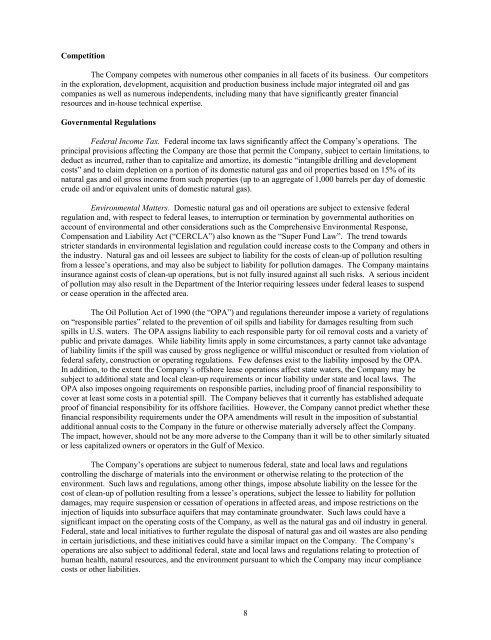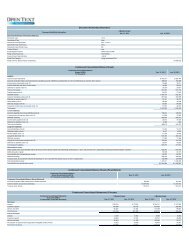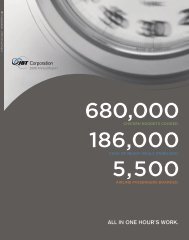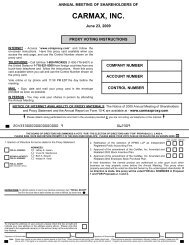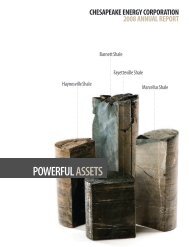FORM 10-K CONTANGO OIL & GAS COMPANY
FORM 10-K CONTANGO OIL & GAS COMPANY
FORM 10-K CONTANGO OIL & GAS COMPANY
Create successful ePaper yourself
Turn your PDF publications into a flip-book with our unique Google optimized e-Paper software.
Competition<br />
The Company competes with numerous other companies in all facets of its business. Our competitors<br />
in the exploration, development, acquisition and production business include major integrated oil and gas<br />
companies as well as numerous independents, including many that have significantly greater financial<br />
resources and in-house technical expertise.<br />
Governmental Regulations<br />
Federal Income Tax. Federal income tax laws significantly affect the Company’s operations. The<br />
principal provisions affecting the Company are those that permit the Company, subject to certain limitations, to<br />
deduct as incurred, rather than to capitalize and amortize, its domestic “intangible drilling and development<br />
costs” and to claim depletion on a portion of its domestic natural gas and oil properties based on 15% of its<br />
natural gas and oil gross income from such properties (up to an aggregate of 1,000 barrels per day of domestic<br />
crude oil and/or equivalent units of domestic natural gas).<br />
Environmental Matters. Domestic natural gas and oil operations are subject to extensive federal<br />
regulation and, with respect to federal leases, to interruption or termination by governmental authorities on<br />
account of environmental and other considerations such as the Comprehensive Environmental Response,<br />
Compensation and Liability Act (“CERCLA”) also known as the “Super Fund Law”. The trend towards<br />
stricter standards in environmental legislation and regulation could increase costs to the Company and others in<br />
the industry. Natural gas and oil lessees are subject to liability for the costs of clean-up of pollution resulting<br />
from a lessee’s operations, and may also be subject to liability for pollution damages. The Company maintains<br />
insurance against costs of clean-up operations, but is not fully insured against all such risks. A serious incident<br />
of pollution may also result in the Department of the Interior requiring lessees under federal leases to suspend<br />
or cease operation in the affected area.<br />
The Oil Pollution Act of 1990 (the “OPA”) and regulations thereunder impose a variety of regulations<br />
on “responsible parties” related to the prevention of oil spills and liability for damages resulting from such<br />
spills in U.S. waters. The OPA assigns liability to each responsible party for oil removal costs and a variety of<br />
public and private damages. While liability limits apply in some circumstances, a party cannot take advantage<br />
of liability limits if the spill was caused by gross negligence or willful misconduct or resulted from violation of<br />
federal safety, construction or operating regulations. Few defenses exist to the liability imposed by the OPA.<br />
In addition, to the extent the Company’s offshore lease operations affect state waters, the Company may be<br />
subject to additional state and local clean-up requirements or incur liability under state and local laws. The<br />
OPA also imposes ongoing requirements on responsible parties, including proof of financial responsibility to<br />
cover at least some costs in a potential spill. The Company believes that it currently has established adequate<br />
proof of financial responsibility for its offshore facilities. However, the Company cannot predict whether these<br />
financial responsibility requirements under the OPA amendments will result in the imposition of substantial<br />
additional annual costs to the Company in the future or otherwise materially adversely affect the Company.<br />
The impact, however, should not be any more adverse to the Company than it will be to other similarly situated<br />
or less capitalized owners or operators in the Gulf of Mexico.<br />
The Company’s operations are subject to numerous federal, state and local laws and regulations<br />
controlling the discharge of materials into the environment or otherwise relating to the protection of the<br />
environment. Such laws and regulations, among other things, impose absolute liability on the lessee for the<br />
cost of clean-up of pollution resulting from a lessee’s operations, subject the lessee to liability for pollution<br />
damages, may require suspension or cessation of operations in affected areas, and impose restrictions on the<br />
injection of liquids into subsurface aquifers that may contaminate groundwater. Such laws could have a<br />
significant impact on the operating costs of the Company, as well as the natural gas and oil industry in general.<br />
Federal, state and local initiatives to further regulate the disposal of natural gas and oil wastes are also pending<br />
in certain jurisdictions, and these initiatives could have a similar impact on the Company. The Company’s<br />
operations are also subject to additional federal, state and local laws and regulations relating to protection of<br />
human health, natural resources, and the environment pursuant to which the Company may incur compliance<br />
costs or other liabilities.<br />
8


